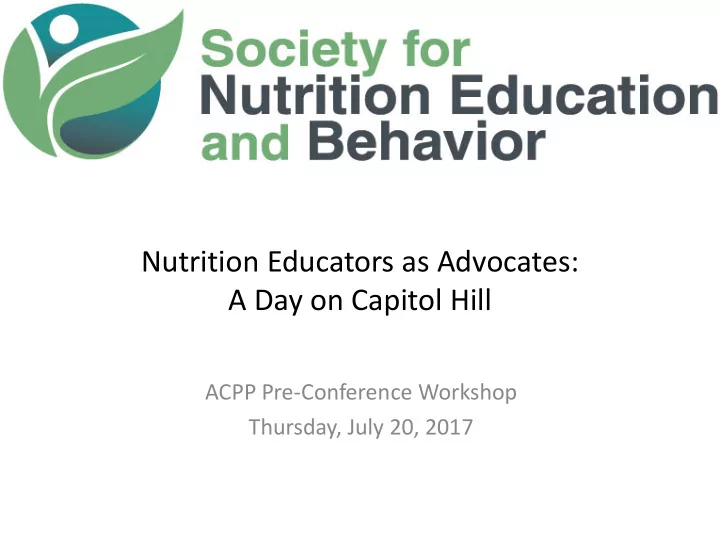

Nutrition Educators as Advocates: A Day on Capitol Hill ACPP Pre-Conference Workshop Thursday, July 20, 2017
Why is Advocacy Needed? What is Advocacy? Tracy Fox, MPH, RD President, Food, Nutrition & Policy Consultants, LLC Culver, IN tracy@foodnutritionpolicy.com @TracyFoxRD
Lobbying vs. Advocacy Lobbying • Influencing the legislative process either directly or through grassroots approaches – appeals to the public/others suggesting that they contact their elected rep. • Definition varies based on individual and organization. • Narrowly defined in laws; ind. and orgs. that lobby must comply with laws; public funds generally cannot go towards lobbying; not-for-profit status can be questioned.
Advocacy It’s OK to Advocate! • Advocacy refers to the set of skills used to create a shift in public opinion and mobilize the necessary resources and forces to support an issue, policy, or constituency. • Lobbying generally includes advocacy; advocacy does not necessarily include lobbying. • No statutes or legal terms for advocacy. • Don’t have to register to be an advocate. • While everyone is (or should be) an advocate, not everyone is a lobbyist! (thank goodness…).
Strengthening Your Involvement • Visit D.C. and your state capital to meet your legislators in their own environment. • Send promotional items, newsletters, and press clippings to your elected representatives on a regular basis. • Invite local Congressional staff & Members to visit your facility and to visit various agencies. • Stay updated on what lawmakers are up to and connect with them regularly.
Examples • Developing non-partisan research and analysis (preparation of issue briefs; one-pagers about your program). • Briefing policy makers on public health funding issues, infrastructure, or a public health epidemic in your area like lead poisoning, obesity, diabetes. • Testifying at a Board of Ed open meeting on nutrition education in schools; vending machines in schools. • Briefing policy makers and taking a position on a particular piece of legislation that will negatively impact public health. • Being asked to testify. • Asking to testify.
“Never doubt that a small group of thoughtful, committed citizens can change the world. Indeed, it is the only thing that ever has.” Margaret Meade
The Big Picture Item s in Congress The four congressional actions the White House wants to see before the August recess Pass a repeal of Obamacare before members of Congress return to their constituents Lift the debt ceiling to prevent the risk of defaulting on debt obligations Agree on the outlines of a broad overhaul of the nation’s tax code Clear outstanding executive and judicial branch nominations Sources: “What the White House wants from Congress before the August recess,” POLITICO, July 11, 2017. 8 July 11, 2017 | Madelaine Pisani
Health Care State of Play • Important for nutrition education – Prevention and Public Health Fund State Fact Sheets • Passed in the House • Senate staying in town • What’s next?
10
Nutrition Education Programs in the Farm Bill
The budget process has six steps
Nominations & Confirmations in the Senate
Recommend
More recommend